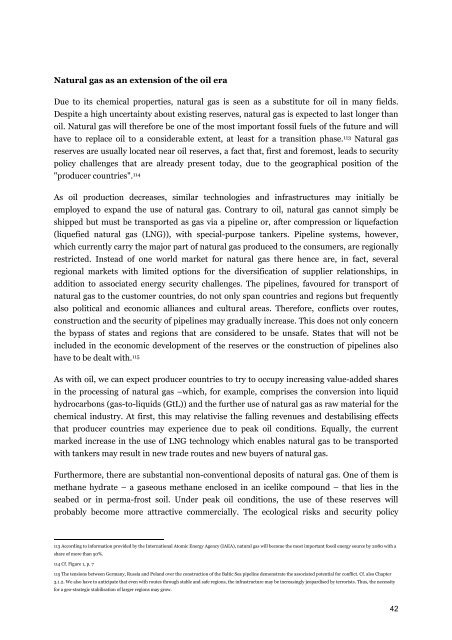PEAK OIL
PEAK OIL
PEAK OIL
You also want an ePaper? Increase the reach of your titles
YUMPU automatically turns print PDFs into web optimized ePapers that Google loves.
Natural gas as an extension of the oil era<br />
Due to its chemical properties, natural gas is seen as a substitute for oil in many fields.<br />
Despite a high uncertainty about existing reserves, natural gas is expected to last longer than<br />
oil. Natural gas will therefore be one of the most important fossil fuels of the future and will<br />
have to replace oil to a considerable extent, at least for a transition phase. 113 Natural gas<br />
reserves are usually located near oil reserves, a fact that, first and foremost, leads to security<br />
policy challenges that are already present today, due to the geographical position of the<br />
"producer countries". 114<br />
As oil production decreases, similar technologies and infrastructures may initially be<br />
employed to expand the use of natural gas. Contrary to oil, natural gas cannot simply be<br />
shipped but must be transported as gas via a pipeline or, after compression or liquefaction<br />
(liquefied natural gas (LNG)), with special-purpose tankers. Pipeline systems, however,<br />
which currently carry the major part of natural gas produced to the consumers, are regionally<br />
restricted. Instead of one world market for natural gas there hence are, in fact, several<br />
regional markets with limited options for the diversification of supplier relationships, in<br />
addition to associated energy security challenges. The pipelines, favoured for transport of<br />
natural gas to the customer countries, do not only span countries and regions but frequently<br />
also political and economic alliances and cultural areas. Therefore, conflicts over routes,<br />
construction and the security of pipelines may gradually increase. This does not only concern<br />
the bypass of states and regions that are considered to be unsafe. States that will not be<br />
included in the economic development of the reserves or the construction of pipelines also<br />
have to be dealt with. 115<br />
As with oil, we can expect producer countries to try to occupy increasing value-added shares<br />
in the processing of natural gas –which, for example, comprises the conversion into liquid<br />
hydrocarbons (gas-to-liquids (GtL)) and the further use of natural gas as raw material for the<br />
chemical industry. At first, this may relativise the falling revenues and destabilising effects<br />
that producer countries may experience due to peak oil conditions. Equally, the current<br />
marked increase in the use of LNG technology which enables natural gas to be transported<br />
with tankers may result in new trade routes and new buyers of natural gas.<br />
Furthermore, there are substantial non-conventional deposits of natural gas. One of them is<br />
methane hydrate – a gaseous methane enclosed in an icelike compound – that lies in the<br />
seabed or in perma-frost soil. Under peak oil conditions, the use of these reserves will<br />
probably become more attractive commercially. The ecological risks and security policy<br />
113 According to information provided by the International Atomic Energy Agency (IAEA), natural gas will become the most important fossil energy source by 2080 with a<br />
share of more than 50%.<br />
114 Cf. Figure 1, p. 7<br />
115 The tensions between Germany, Russia and Poland over the construction of the Baltic Sea pipeline demonstrate the associated potential for conflict. Cf. also Chapter<br />
3.1.2. We also have to anticipate that even with routes through stable and safe regions, the infrastructure may be increasingly jeopardised by terrorists. Thus, the necessity<br />
for a geo-strategic stabilisation of larger regions may grow.<br />
42


